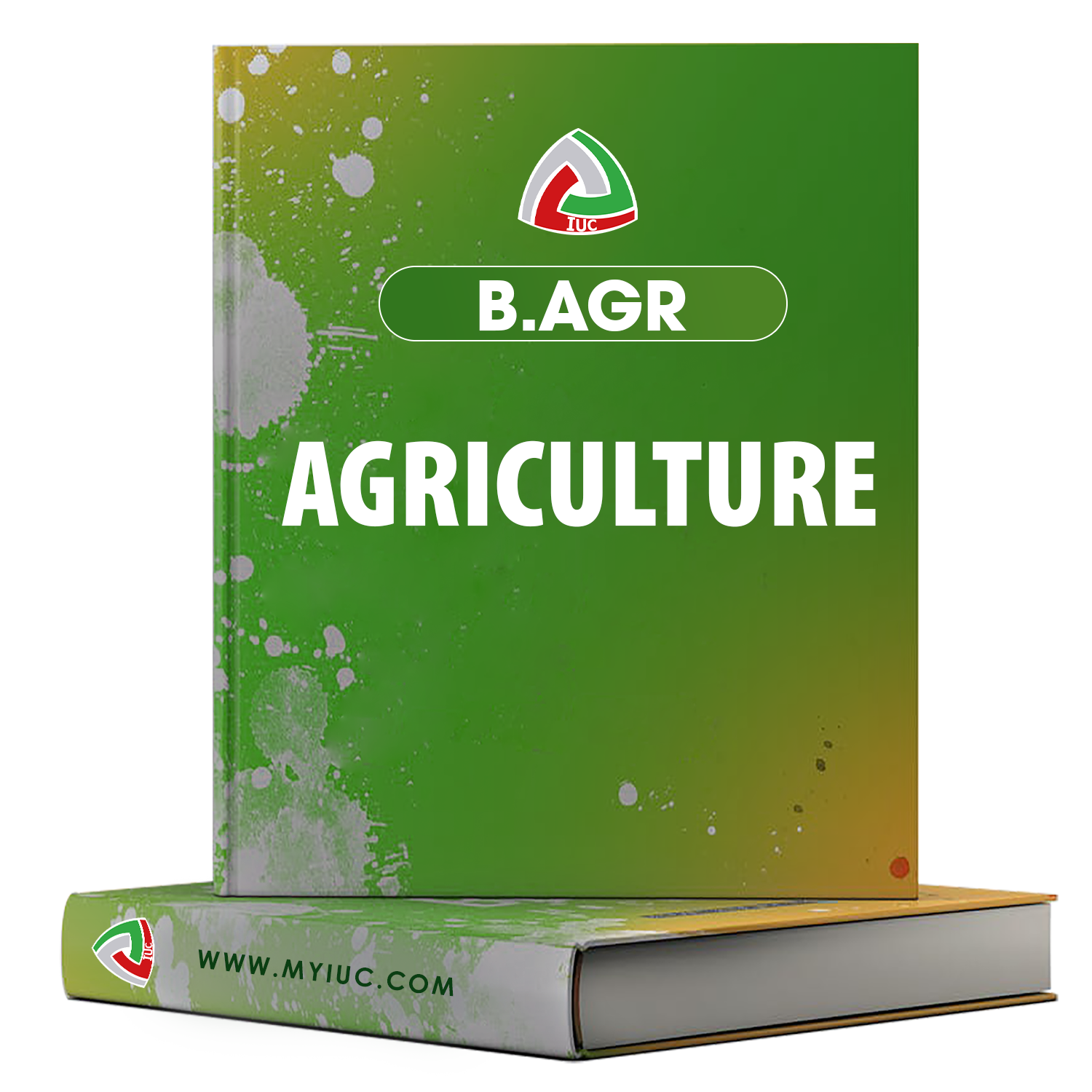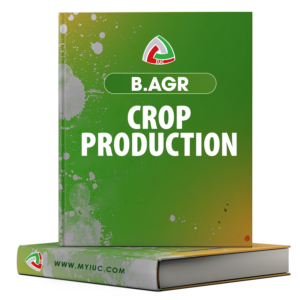The Bachelor in Agriculture program is designed to produce well-rounded professionals equipped with both theoretical knowledge and practical skills in agriculture. The core objectives focus on developing expertise in crop and livestock production, promoting innovation and sustainability, understanding agricultural economics and management, and preparing graduates to engage in rural development and community service. This well-rounded education ensures that graduates are capable of addressing the complex challenges facing the agriculture industry while contributing to the advancement of food security, sustainability, and rural development.
| PROGRAMME |
SEMESTRE |
DURATION |
CREDIT |
PARTNER INSTITUTION |
ACCREDITATION |
| AGRICULTURE |
8 SMESTERS |
4YEARS |
240 |
UNIVERSITY OF BUEA |
|
CORE OBJECTIVES
1. Develop a Strong Understanding of Agricultural Sciences
- – Crop Production: Teach students the principles of crop cultivation, including soil management, irrigation, pest control, and crop rotation to ensure optimal yield and sustainability.
- – Livestock Management: Equip students with knowledge of animal husbandry, including breeding, nutrition, health management, and welfare to enhance productivity and animal well-being.
- – Soil Science: Provide students with an understanding of soil health, fertility management, and soil conservation techniques to support sustainable agriculture.
- – Agricultural Biotechnology: Introduce students to genetic engineering, plant breeding, and biotechnological advancements that can improve crop resistance and productivity.
2. Promote Sustainable Agricultural Practices
- – Environmental Sustainability: Teach students the importance of environmental stewardship in agriculture, including methods for reducing carbon footprints, conserving water, and preventing soil degradation.
- – Agroecology: Equip students with knowledge of ecological farming practices that integrate biodiversity, conservation, and natural resource management into agricultural systems.
- – Climate Change Mitigation: Introduce strategies for adapting farming practices to the impacts of climate change, focusing on resilient crops and sustainable water management.
3. Enhance Agricultural Economics and Management Skills
- – Farm Management: Provide students with the tools to manage farms effectively, including financial planning, budgeting, and resource allocation.
- – Agricultural Economics: Teach students the principles of agricultural economics, focusing on market trends, price analysis, and the economic viability of different farming practices.
- – Agribusiness: Introduce students to the business side of agriculture, including marketing, supply chains, and business strategy to ensure farm profitability and growth.
4. Develop Expertise in Agricultural Technology and Innovation
- – Agricultural Engineering: Equip students with knowledge of modern agricultural machinery, automation, and innovations that improve efficiency and productivity.
- – Precision Agriculture: Teach students the use of technology such as GPS, drones, and sensors to optimize farming practices, monitor crop health, and manage resources more effectively.
- – Sustainable Technologies: Introduce students to green technologies, such as renewable energy sources and sustainable irrigation systems, that can be integrated into agricultural practices.
5. Foster Agricultural Research and Development
- – Agricultural Research: Encourage students to engage in research projects that contribute to the advancement of farming techniques, crop genetics, pest management, and food production systems.
- – Innovation in Food Security: Prepare students to develop solutions for global food security issues, focusing on increasing food production and reducing food waste.
- – Data-Driven Agriculture: Equip students with the ability to analyze data from farm operations and research to make informed decisions that improve productivity and sustainability.
6. Prepare Students for Agricultural Policy and Rural Development
- – Agricultural Policy: Provide students with an understanding of the role of government policies in shaping agricultural practices, including land use, subsidies, and trade regulations.
- – Rural Development: Teach students how to foster economic development in rural communities, focusing on entrepreneurship, education, and sustainable community practices.
- – Food Systems and Global Trade: Educate students about the global food system, international agricultural trade, and the impact of globalization on local farming practices.
7. Strengthen Communication, Leadership, and Teamwork Skills
- – Effective Communication: Equip students with the ability to communicate complex agricultural information to both technical and non-technical audiences through reports, presentations, and public speaking.
- – Leadership and Management: Develop leadership skills to manage agricultural projects, lead teams, and make strategic decisions in the agriculture sector.
- – Collaboration and Networking: Promote collaboration with local farmers, researchers, and policymakers, as well as participation in agricultural networks to build professional relationships and enhance career opportunities.
8. Foster an Understanding of Agricultural Ethics and Sustainability
- – Ethics in Agriculture: Teach students about the ethical considerations in agriculture, such as fair labor practices, animal welfare, and environmental responsibility.
- – Sustainable Development: Encourage students to adopt sustainable farming practices that balance the need for food production with environmental conservation and social responsibility.
9. Prepare Students for Career Readiness and Professional Development
- – Internships and Practical Experience: Offer students the opportunity to gain hands-on experience through internships, field studies, and partnerships with agricultural organizations.
- – Professional Certifications: Guide students in preparing for relevant certifications in agriculture, such as Certified Crop Advisor (CCA) or Certified Agricultural Technician (CAT), to enhance career prospects.
- – Career Services and Networking: Provide career counseling, resume-building support, and networking opportunities with professionals in agriculture to help students transition from education to employment.
10. Encourage Lifelong Learning and Continuous Improvement
- – Commitment to Lifelong Learning: Instill a mindset of continuous professional development, encouraging students to stay current with new agricultural technologies, research, and industry trends.
- – Innovation and Adaptability: Prepare students to innovate and adapt to the rapidly changing agricultural landscape, encouraging them to adopt new practices and technologies that enhance farming systems.
CAREER OPPORTUNITIES
1. Agricultural Manager/Farm Manager
- – Gestion des Opérations Agricoles : Superviser les opérations quotidiennes des fermes, ranchs ou installations de production agricole. Les responsabilités incluent la production de cultures, la gestion du bétail, la budgétisation et la supervision du personnel.
2. Agronomist
- – Spécialisation en Production Végétale : Se spécialiser dans la production de cultures, la science du sol et l’amélioration des plantes. Les agronomes travaillent à améliorer les rendements des cultures, la fertilité des sols et la gestion des maladies des plantes pour assurer des pratiques agricoles durables.
3. Livestock Manager
- – Gestion du Bétail : Gérer les soins, l’élevage et la santé du bétail tel que les bovins, les ovins, les volailles et les porcs. Ce rôle implique d’améliorer la santé animale, de gérer les programmes d’élevage et d’assurer une production efficace de viande, de lait et d’autres produits animaux.
4. Agricultural Consultant
- – Conseil Agricole : Fournir des conseils experts aux agriculteurs, éleveurs et entreprises agricoles sur les meilleures pratiques pour la gestion des cultures, la lutte contre les ravageurs, la fertilité des sols et les pratiques durables. Les consultants aident également à améliorer la rentabilité et l’efficacité de la production.
5. Horticulturist
- – Culture des Plantes : Se concentrer sur la culture des fruits, légumes, fleurs et plantes ornementales. Les horticulteurs peuvent travailler dans des serres, des jardins botaniques ou dans la conception de paysages, aidant à développer de nouvelles variétés de plantes ou à optimiser la production agricole.
6. Agricultural Economist
- – Analyse Économique Agricole : Analyser les tendances du marché, les politiques et les facteurs économiques affectant l’agriculture. Les économistes agricoles fournissent des informations sur les prix des produits de base, les chaînes d’approvisionnement et la faisabilité économique, aidant les entreprises et les gouvernements à prendre des décisions éclairées.
7. Agribusiness Manager
- – Gestion des Entreprises Agricoles : Superviser le côté commercial de l’agriculture, y compris la gestion des chaînes d’approvisionnement agricoles, le marketing, les ventes et les opérations. Les gestionnaires d’agroentreprise travaillent avec des entreprises qui produisent des aliments, des boissons et des produits agricoles.
8. Farm Equipment Technician/Mechanic
- – Maintenance des Équipements Agricoles : Se spécialiser dans la maintenance et la réparation des machines et équipements agricoles. Les techniciens s’assurent que les tracteurs, les moissonneuses et les systèmes d’irrigation fonctionnent correctement pour maintenir la productivité de la ferme.
9. Food Safety Specialist
- – Sécurité Alimentaire : Surveiller les normes de sécurité alimentaire dans la production et la transformation agricoles, en veillant à ce que les produits alimentaires respectent les réglementations de santé et de sécurité. Ils travaillent avec les agriculteurs, les producteurs et les transformateurs alimentaires pour prévenir la contamination et assurer la qualité.
10. Agricultural Policy Analyst
- – Analyse des Politiques Agricoles : Travailler avec des agences gouvernementales, des ONG ou des institutions de recherche pour analyser et créer des politiques qui impactent l’agriculture. Cela inclut l’étude des réglementations sur le commerce, les subventions, la protection de l’environnement et l’utilisation des terres.


![BBA - COMMERCE INTERNATIONAL - EUROPE-ASIE [ISUGA]](https://myiuc.com/wp-content/uploads/2024/11/ISUGA-300x300.png)





